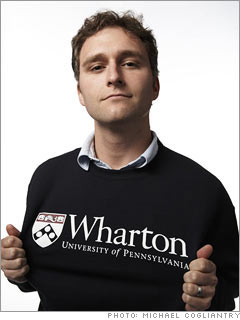The Wharton School of the University of Pennsylvania
I had just ended a stint at an Internet startup when I realized I wanted to go into business for myself. I wasn't sure exactly how, which is why Wharton was so appealing to me. I had graduated with a BA five years before in political science, and I knew I had a lot to learn. Wharton seemed like a vibrant place, and its two-year MBA program offered a lot of opportunity to explore.
The first year I grounded myself in the core basics, from marketing to finance to statistics. That was when I began to think about starting my own company. Even though there weren't any classes specific to pitching business ideas, there were plenty of opportunities to do so - including the Wharton Business Plan Competition. As part of the protocol, I submitted five proposals to VCs and entrepreneurs for feedback. They liked the idea for a company called Home-Base USA (homebase-usa.com), an outsourcing agency that provides customer-service call centers with staff made up of military spouses working from home. This would help the spouses continue to work no matter where their loved ones are stationed.
The next step was to write the business plan. Instead of taking a class, I went to seminars and panels. On average, there were two speakers every day, ranging from entrepreneurs, to Wharton professors, to venture capitalists, to renowned CEOs. I also took advantage of Wharton's Entrepreneurs in Residence Program. Each week, one successful Wharton grad would have one-on-one conversations with aspiring entrepreneurs. Those were extremely helpful. For even more exposure, I attended speeches and forums put together by the MBA Entrepreneurship club, where I met Jeff Flur, founder of the ticket-selling mega-site StubHub.com. I loved bouncing ideas off these seasoned business leaders to make Home-Base USA better and better. By the end of the year, I had spoken with so many VCs and entrepreneurs that I knew how to write a stellar plan and form a solid team. I placed third in the competition and won $5,000. The exposure led to an additional $5,000 from a law firm and $5,000 from an accounting firm.
In my second year, I enrolled in an independent study program with marketing professor David Reidstein to define and pursue Home-Base's target market. That year I also applied to the Venture Initiation Program, which provided me with an added $2,500 in seed money, plus an advisor and an office. I graduated this summer and am moving into operational mode very quickly. But even after I leave my Wharton office in December, I know that I'll still be part of Wharton's community.

